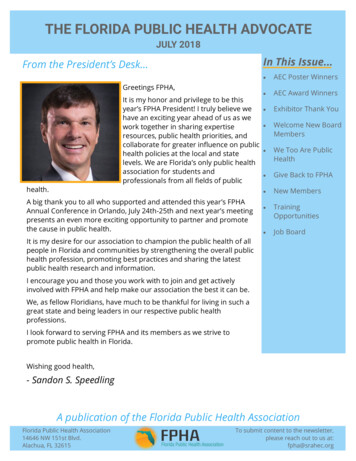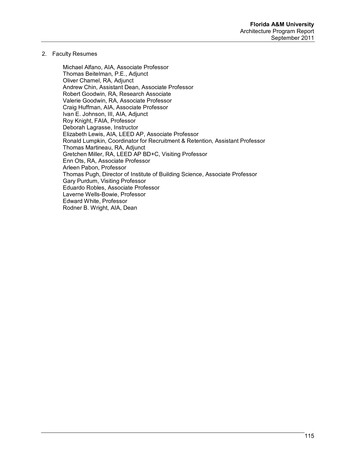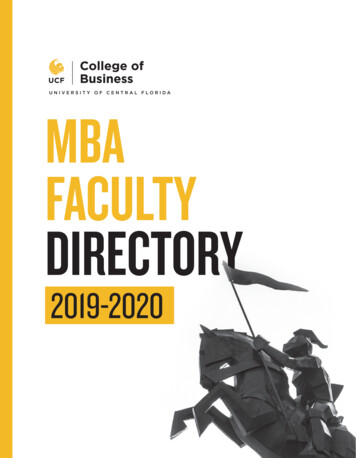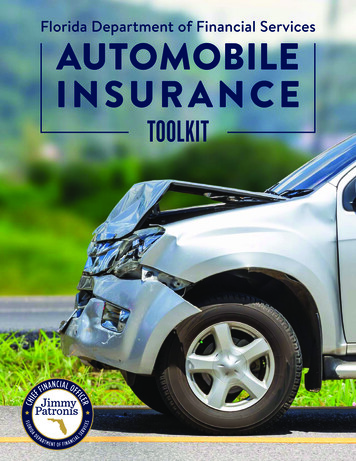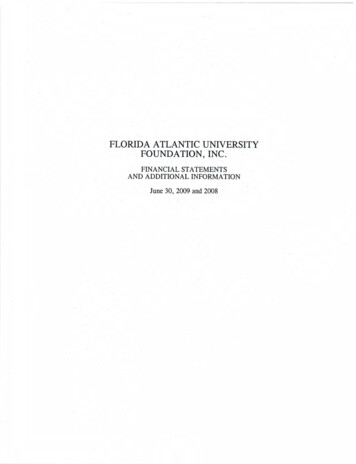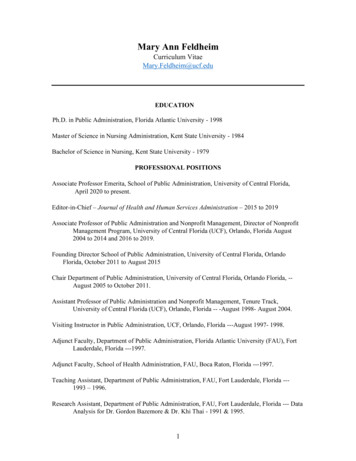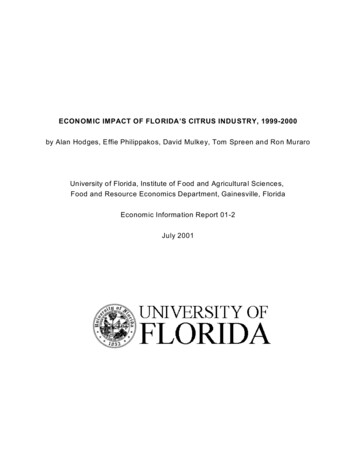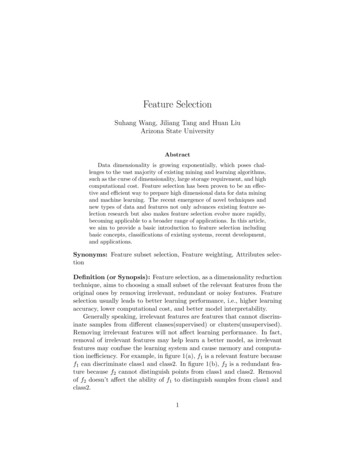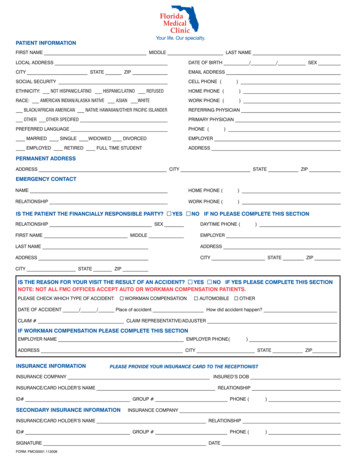
Transcription
FEATURE StoryThe Success of a TeamBeth Moorereport to the EOC to help out duringthe pandemic?”UF/IFAS Extension Florida 4-H YouthDevelopment program Madison CountyExtension Agent IIelizabethmoore@ufl.eduMarch 18, 2020:4-H Agent reports to EOC and workedfrom there until May 4, 2020.March 16, 2020:Summer Day Camps planned. CampCherry Lake week planned. Club meetings and county council meetingsscheduled and planned. County Eventsscheduled and planned. Chick Chainproject scheduled and planned.My first thought was, “I am a 4-H agent,not an emergency management specialist or office assistant.” My secondthought was, “No, I am a teamplayer and my team (Madison County)needs me!”March 17, 2020:Call from County Manager, “Weare short staffed at the EmergencyOperations Center for countyemergency management, can youMerriam-Webster’s definition of a teamplayer is someone who cares moreabout helping a group or team to succeed than about his or her own success.So, I reported to the EOC building tocontinued on next pageJune – August 2020In this ISSUESensory Station IncreasesAwareness of AgriculturalIndustries of Florida2What I learned (orre-learned) in the lasteight weeks3Plug In to theExtension Cord4Watermelon SeasonRe-cap5FriYAY with 4-H64-H In Action: MeetingCommunity Needs6What’s the differencebetween a UF ChangeFund and a UF PettyCash Fund?7Teladoc . it’s real, notjunk mail8One simple question,“What is a 4-H Member?” 8Beth Moore is pictured with Leigh Basford, UF/IFAS Extesnion Madison County Director.Taking FeedbackGracefully9Featured Office:Columbia County10Let’s Meet Some Agents11
Northeast NewsThe Success of a Team.continued from previous pageassist the Emergency Management director during a time unlike any otherour community had experienced. Theuncertainty, the questions, and thenervousness began as we learnedmore about the virus. Businesses, restaurants, and offices closed, and manywere sent to work from home. Daily Ianswered phone calls from concernedcitizens with questions that at the timeno one had clear answers for. I organized emergency meal kit deliveries forthe citizens of Madison County. I tookminutes at Community Safety Partnermeetings. I helped organize and distribute PPE (personal protective equipment)to local health care agencies. Therewere also several days the county experienced severe weather and tornados touching down. All while fulfillingmy 4-H and extension obligations. Wechanged our club meetings to onlineZoom meetings, cancelled our summercamp plans, reorganized County Eventsand restructured our programs to anonline/at home format—as a team!UF/IFAS Extension team! This teamis not afraid of change or challenges,which has been evident in the responseto this COVID-19 global pandemic andadjusting our program services/areas. What I see is a team full of “TeamPlayers” working together for the success of our mission!our youth by your example of teamwork and by “taking one for the team”.And sometimes we have to step outsideof our comfort zone (and into the EOC)to take one for the team and learn newthings. Because I was at the EOC for amonth and a half, I learned things thatcan help improve my 4-H program!I have been on many teams in my life(sports, clubs, schools) and now I amproud to say that I am a member of theIn 4-H we are striving to teach ouryouth life skills and one is citizenship/community service. Continue to teachSo team, keep up the good work and remember your success is dependent onthe success of the team!Sensory Station IncreasesAwareness of AgriculturalIndustries of Floridahave a positive view of agriculture,they may not work to support theindustries or recognize their importance on a local and statewide level.Therefore, extension agents in BakerCounty partnered to establish an Agawareness and appreciation programwith objectives based on UF/IFASExtension statewide initiatives.ranching, forestry, equine, and dairy.Using the senses allowed participantsto recognize familiar objects associated with the corresponding agricultural industry and connect with theeducational content presented. To capture their interest, smells of flowersand pine trees were used to representthe floriculture and timber industries.Equine radiographs and a video looking inside of a beehive representedthe equine and apiculture industries.Touching the corn, cotton seed andgrain in livestock feed brought attention to the diverse aspects of Florida’sranching industry, while the milkingof a simulated udder (everyone’sfavorite activity) symbolized Florida’sdairy industry.Alicia LambornUF/IFAS Extension Baker CountyEnvironmental Horticulture,Alicia HalbritterUF/IFAS Extension Baker CountyAgriculture/Natural ResourcesShaina SpannUF/IFAS Extension Baker County4-H Youth DevelopmentAgricultural products in Baker Countyhave over 13 million in market value.But despite being a rural community,only a small portion of Baker countyresidents (population 28,000) are involved in commercial agriculturalproduction. While residents generally2Northeast NewsJune – August 2020To prepare for the program, a sensorystation was built to promote interactiveengagement and learning through thesenses. Custom built tables were madeto hold plastic bins with materials thatengage the senses of sight, touch, andsmell. Each bin was accompanied withan educational poster highlightingagricultural industries of Floridaincluding floriculture, apiculture,continued on next page
Northeast NewsSensory Station Increases Awareness of Agricultural Industries of Florida.continued from previous pageSince opportunities to engage with residents are greatest at community functions, the sensory station was utilizedduring family-friendly events to reachpeople of all ages. Presentations, discussions, and educational poster content were all used to raise awarenessof the types of agricultural production,the variety of everyday products produced from those industries, and theireconomic importance to the state. Sincethe environment accommodated different learning styles while being funand interactive, it appealed to a broaderaudience.At least 2,540 individuals interactedwith the station during three community events in 2019, with an estimated60% gaining knowledge of Florida’sagricultural industries. Additionally,at least four students identified byteachers as having sensory disordersovercame their fears to participate andlearn about agriculture using theirsenses. With the station’s popularityand ease for changing the educationalcontent, future plans include highlighting additional agricultural industries.For example, during the Baker CountySpring Garden Festival of 2021, the focus will be on Florida’s horticulture andgreen industries.From the DISTRICT DIRECTOREric SimonneUF/IFAS ExtensionDED – NE Districtesimonne@ufl.eduWhat I learned (orre-learned) in the lasteight weeksAs what we think we knew is challenged every day during the COVID-19pandemic, I have found myself pondering and re-evaluating communicationstrategies. Maybe we have more time.May be people communicate more. Maybe the pandemic itself generates a lotof talks and articles world-wide. In allthis “noise”, I found leadership lessons,uncovered debating strategies, learnednew roles for grammar, and wonderedmore than ever about the role ofscience in decision making.Leadership lessons: Knee-jerk reaction is no substitutefor leadership. Thought: Has itever been? Making statements that are not supported by science and then failing totake responsibility for consequencesis cause for firing in most professional situations. Do not do it!Note: That’s why Extension isscience based The 1927 Eisenberg incertitude principle stating that “the position andthe velocity of an object cannot bothbe measured exactly at the sameNortheast NewsJune – August 20203
Northeast NewsWhat I learned (or re-learned) in the last eight weeks.continued from previous pagetime, even in theory”, seem to alsoapply to democracy and freedom:individual interests (position) areoften times incompatible with thecollective common good (velocity).Comment: Houston, we havea problem!Debating strategiesIn many situations, HOW ideas are presented, explained, or articulated is moreconvincing that WHAT message theycarry. RE: what is new about that? Hereare a few common communicationstrategies: Distraction which consists in providing an answer that does not matchthe question, is as old as debate itself. When a response starts with“First of all,.” be on the lookout!.Note: What was the question again? Avoidance (sometimes seen as avariant of distraction) consists inproviding a long, detailed answer toa question that call for a “yes” or “no”answer. By the time the speaker isdone answering, the audience forgotwhat the question was. Example:“Was your experiment replicated?”Answer: Scientists who tend to seethings in true or false have a hardtime practicing avoidance to theiradvantage. Diversion (changing the topic of conversation) is a handy tactic when adiscussion does not unfold in yourfavor. Note: it does not solve the issuebut surely buys time. Blame shifting is a convenient substitute to accepting responsibility.Example: my sister made me do it! Starting an explanation with an incorrect statement and immediatelyfollowing it up with a commonly accepted truth is a strategy sometimescalled “covering up”. Ending with astatement that both sides can agreeon widens the already establishedimpact of the incorrect statement. Reverse accusation (claiming theother side is doing what you actually did) is an advanced techniquethat combines diversion and blameshifting. Example: when 6 and 8years-old siblings fight on the familycar back seat: “she looked at me first”.Note: brilliant! Denial helps take the high moralroad and leaves the speaker beyondquestion. If questioned later, a quickqualifier can bring you back to thelow road. Example: I have never lied.That’s right; I have never lied.to you.Thought: you are in trouble!Use grammar to your advantageWe always thought that grammar isonly a set of conventions and rules thatguide and clarify communication.How about using grammar as amisleading strategy?Starting a sentence and not finishing itis a strategy that allows the expressionof an idea without saying anything.Adding qualifiers to the nounsfurther allows to create associations orcharacterizations that are moreimportant than the phrase itself.Using “this” in an ambiguous way isa very simple way to confuse youraudience.What about science? If science is not the basis for decision making, then what are the decisions based on? Classifying data as “good” when it issupports one hypothesis and “bad”if it does not, is not a scientificallysound method. Data are data; onlyinterpretation and applications arematters of choice. Expressing results as percentages,and then performing additions, subtractions or further combining themis a great way to hide what the dataoriginally showed. RE: accountantscall that “cooking the books”. Using false linear scales (spreadingpoints equidistantly on the X-axisthat represent different day increments for example) is a simple wayto give a misleading linear trend. Sorting data by decreasing trendand failure to mention in on theX-axis is also a powerful way toalter the original message of theoriginal data – and “borderline”scientifically disInformation TECHNOLOGIESPlug In to theExtension CordTaylor Clem, PhDUF/IFAS Extension Alachua CountyEnvironmental & Community Horticulture Agent IItaylorclem87@ufl.eduWhile working remotely, AlachuaCounty’s Taylor Clem took theopportunity to start UF/IFAS Extension4Northeast NewsJune – August 2020Alachua County’s new podcast called“Extension Cord,” which is now availableon all major platforms (https://anchor.fm/ExtensionCord). Extension Cordis a new podcast where the countyagents discuss special topics inAlachua County by speakingwith Master Gardener Volunteers,researchers, specialists, andcommunity members contributingwonderful impacts to our community.Although the intention was to recordepisodes in the recording studio createdby the agents, the new home-studiowas more unique. While working fromhome, Taylor and his wife would sharecontinued on next page
Northeast NewsPlug In to the Extension Cord.continued from previous pagea work space. Therefore, to recordepisodes, Taylor’s son, Scotland, wasmore than willing to allow his dad toset-up a temporary studio at his artsand crafts table.Episode topics include an introductionto extension in Alachua County, foodsafety, summer vegetable gardening,and the Florida-Friendly Landscapingprogram. Subscribe to the podcast onyour favorite carrier and check-out ourcurrent episodes. If you are interestedin participating in any future episodes,reach out to Taylor.What’s WORKING?Watermelon SeasonRe-cap(two pictures go with this)Tatiana Sanchez, DPMUF/IFAS ExtensionCommercial Horticulturetatiana.sanchez@ufl.eduWatermelon in the Suwannee Valleyregion which represents 1/3 of the state’sacreage always comes with challenges.Although dry and hot weather at thebeginning of the season kept the cropdisease-free for several weeks, foliardiseases went rampant from mid-season until the end. Two major enemies,downy and powdery mildew, were thefocus for most growers. If not managedpreventatively, these foliar diseases (inparticular, downy mildew a.k.a “wildfire”) will destroy the leaves, depriving the fruit from food and essentialsun coverage. An underground enemy,Fusarium wilt, kept affecting the croplonger than previous seasons possiblybecause of the unusually cold weatherexperienced during April, which favorsFusarium. Other issues included squashbugs, aphids, rindworms, virus andmany instances of lightning strikes.All these issues and managementrecommendations (including nutrients)were promptly communicated togrowers by a team of extension agentswho work together in delivering weeklytext updates and other in-seasonsupport. After all this effort, it is nowtime to enjoy local watermelons!Northeast NewsJune – August 20205
Northeast NewsSUCCESS StoriesFriYAY with 4-HKelsey HauptUF/IFAS Extension Duval County4-H Extension Agentkhaupt@ufl.eduGrace CarterUF/IFAS Extension Duval County4-H Extension Agentgrace.carter@ufl.eduThe COVID-19 pandemic has forcedyouth to take online classes, watchmore virtual lectures, and spend lesstime with friends. Bartlett and Vivrette(2020) argue, “to support healthy childdevelopment during COVID-19, childrenand youth need to maintain regularage-appropriate connections to important youth and adults in their lives Even short periods of time playing,reading, going outdoors, and talkingcan bolster children’s sense of safetyand security during uncertain orscary times.”In Duval County 4-H, we recognizedthat social distancing does not haveto mean relational distancing. Our4-H members needed a place to connect with their friends, so we createdFriYAYs with 4-H. FriYAYs happen each4-H In Action: MeetingCommunity NeedsMarnie Ward, Ph.D.UF/IFAS Extension Florida 4-H Youth DevelopmentProgram Citrus CountyExtension Agent Imlward@ufl.eduCitizens across the country havestepped forward in this time of needto support their communities. Manyhave provided healthcare workers withmeals and a place to stay, volunteering at food distribution sites, or stayinghome to stop the spread Americans areunified and strong. Young people arealso engaged in these communityconversations, using their skills andexpertise to make a difference intheir communities.6Northeast NewsJune – August 2020Friday at 2:00pm for junior and intermediate 4-H youth via a secure zoomplatform. FriYAY’s feature an activity with household supplies, games,and time to catch up with friends. PastFriYAYs have included natureart, homemade ice cream, popsiclecatapults, and so much more.But our primary focus is onconnections over content. Youth whoDiana Ward, a Citrus High SchoolSenior dual enrolled at the Collegeof Central Florida, is the president ofthe 4-H Cre8 sewing club. The CitrusCounty 4-H program empowers youthwith hands-on experiences learningthe skills to lead for a lifetime. Whennews outlets began reporting theCOVID-19 virus was moving across thecountry, she began researching to learnmore about the disease and its impacts on people and communities. Thisyoung lady has a passion for scienceand a drive to educate her community.Earlier this year, she shared with herfellow 4-H members the value of immunizations and the responsibilities ofcitizens to one another.have joined FriYAYs with 4-H are experiencing 30-45 minutes of time a weeklaughing and engaging with caringadults to bring some “normal” momentsto their lives. Our Duval 4-H membershave been observed laughing, learningnew skills, and sharing what they havelearned with others, building a sense ofbelonging in the Duval 4-H program.When asked about the pandemic, shestated “I had heard about a novel virusin China, but I didn’t realize it wouldcome to have such an impact on mylife.” By the end of March, all CitrusCounty Schools were closed and allCounty 4-H Club meetings were cancelled. She then learned that the virus could be spread by close contactand that facemasks could reduce thespread. Here, Diana saw a way to help.An avid sewer, Diana began sewingwhen she was 8 years old. She haddesigned and sewn dresses, bags andblankets for her family, friends andherself. Over time, she began to use hercontinued on next page
Northeast News4-H In Action: Meeting Community Needs.continued from previous pagegrowing sewing skills to helpthose in her community. In 2017,when Hurricane Irma passed overCitrus County, Diana and her sister made personal air conditioners for linemen restoring power.The air conditioners were sewnto form a tube of fabric, filled withcooling beads the tube could beplaced across the back of theneck. Diana also organized her4-H club to make blankets to donate to needy children and laterto sew pillowcases for hospitalized children.Recognizing the need for facemasks, Diana began sewingthem for her family and friends.While 4-H clubs were not meeting, Diana continued to talk byphone and Zoom teleconferencing software, with her sewingmentor and 4-H club leader, SueCollins. When the call came thata local home healthcare businessneeded masks, Diana was quickto respond and get to work. Herdays are now filled with onlinehigh school and college classes,and evenings with mask making. She has moved on from thedisappointment of losing SeniorProm, Awards Night, andface-to-face Graduation in May;instead, she is focused on a planfor the future and the differenceshe can make.In July, Diana will begin classesin the College of Agriculture andLife Sciences at the University ofFlorida where she plans to studymicrobiology and genetics.Diana Ward, 4-H Cre8 Club president and a Citrus High Schoolgraduating senior, sewing face masks as a way to supportCitrus County during the COVID-19 pandemic.The 4-H program is open to allyouth ages 5-18 years old, anduses a learn-by-doing approachto help youth gain knowledge andskills to become responsible, productive citizens. Contact theUF/IFAS Extension Citrus Countyoffice to learn more aboutour available programs,including sewing.How Does the UNIVERSITY OF FLORIDA Work?What’s the differencebetween a UF ChangeFund and a UF PettyCash Fund?Change FundA Change Fund is used solely to makechange for customers purchasinggoods or services from the University.No purchases or disbursements canbe made from a Change Fund. The balance of the Change Fund must remainthe same at all times, therefore, ChangeFunds do not require replenishment. Nodocumentation is necessary when providing change for customers.Petty Cash FundA Petty Cash Fund provides a convenient way to pay for minor allowablebusiness purchases. Departmentsshould limit their Petty Cash Fundto the lowest amount that will meettheir needs. Petty Cash Funds shouldnot be used for payments to researchparticipants.New UF system to report outsideactivities and conflict of interests toopen to IFAS on July 1, 2020Beginning July 1, 2020, UF is transitioning IFAS to a centralized reporting andapproval process for Conflictsof Interest and Outside Activitiescalled UFOLIO.Any new reporting for outside activitiesto begin after July 1 must go into theUFOLIO system and not sent toUF/IFAS HR for routing.More information about UFOLIO maybe found here: https://coi.ufl.edu/Northeast NewsJune – August 20207
Northeast NewsGood TO KNOWTeladoc . it’s real, notjunk mailUF/IFAS Extension Columbia CountyExtension Directorhfutch@ufl.eduand selected “Request a visit.” Within 3minutes I was sitting on my front porchhaving a video conference with a doctorfrom Maryland who was able to send aprescription straight to the pharmacyfor me. It was perfect!Did you receive an envelope labeledTeladoc right after all of this COVID-19crazy started happening? If you’re super neat at home or you are really goodat weeding out junk mail you probablythrew it away. However, like most 4-Hagents (sorry guys, but I did only saymost), I’m messy and I added it to mystack of mail on the kitchen table.rightnear my Alternative Work Location.and thought nothing else about it. Well,a month and a half later rolls aroundand I’m getting all these headaches,a fever, a cough, and a toothache. Yes,it all sounds like I had the “Rona”. a“Rona Toothache Sinus Infection Flu”is what I called it, anyways. But afterdays of a fever and feeling horrible, Ifinally looked back through the mailand found the letter from Teladoc andNow, if you’re like me and a child ofmedical parents who raised me to believe that you better be bleeding orhave a bone poking out before you goto the emergency room, or you just really hate the doctor, Teladoc is perfect.With your state insurance, the governormade sure you have access to it for freein one of his earliest proclamations.So, no more excuses, take care of yourself and your family and give it a try.During this time, it’s best if we all stayhealthy and not avoid caring about ourselves. The world will go on without usbut we want you to stay a strong andhealthy part of our Extension Family.As a follow up, I did get the nose swab(no it wasn’t fun) and I am officially freeand clear of the COVID-19, like I thoughtand thanks to Teladoc, I am recovering!Heather Janneydecided to give it a go.after I shared mysickness with the District Director andAssistant County Manager who bothtold me I needed to see a doctor,of course.It was easy, I downloaded the app, putin my information, medical history,DISTRICT LifeOne simple question,“What is a 4-H Member?”Stephanie Conneranswer, a 4-H member is any childbetween the age of 5-18 who has joinedand participated in a 4-H program. Totruly answer the question though, Ifocus on the second answer whichprovides a deeper perspective of justwhat a 4-H member is.I was recently asked a simple questionthat made me pause before I answered.The pause was not because I didn’thave an answer, rather because I hadtwo answers. The first is quick and simple, while the second answer is morein depth and meaningful. So, what wasthe question you might ask, it was“What is a 4-H member”? The short4-H members come in all shapes andsizes, all economic backgrounds, religions, and educational paths. 4-Hmembers are youth who want to explore their interests, grow their skillsand make lifelong friends. These youthare workers and leaders; explorersand adventurers; public speakers andUF/IFAS Extension Florida 4-H YouthDevelopment Program Clay CountyAgent IISconner04@ufl.educontinued on next page8Northeast NewsJune – August 2020
Northeast NewsPROFESSIONAL DevelopmentTaking FeedbackGracefully(Part 2 of We all need feedback, butwhat kind)Beth KerrUF/IFAS Extension Hamilton County4-H/FCS AgentInspired by the following TED talk:Thanks for the Feedback: Shelia Heen,TED Radio Hour Feedback. We receive itdaily from people and from inanimateobjects. Those jeans that are too snug.feedback! Your mom’s smile when yousurprise her with a visit.feedback! And,the performance evaluation from yourboss.feedback! Feedback can bringus joy and sadness. Joyful responsesto feedback are easy to give when thefeedback is what we want. But whatabout the feedback that we do not wantor like?Rejecting FeedbackFeedback can be a painful experience.This partly because we have two basic needs as humans: We want to learnand grow, and we want to feel accepted,respected, and loved just as we arenow. When we receive coaching thatdirects us to improve an aspect of ourjob performance, we often respond defensively. This response taps into ourtendency to protect ourselves. Our initial response says, “He/she is wrong!” Byrejecting feedback on grounds that it is“wrong,” we can move on with life without acknowledging personal or professional shortcomings. If we acknowledge that some aspect of the feedbackis right, we are faced with the needto change. Our tendency is to look forwhat is wrong with the feedback and toseek confirmation from others that thefeedback IS wrong, and we are not.We can always find fault with feedback.It may be due to our inability to face thetruth about our performance. It is noteasy to accept feedback that tells usthat we need to change. Our responsemay be a reaction to the person delivering it. It may be difficult to separate the“who” from the “what” when receivingnegative or constructive feedback. And,lastly, it may be that the feedback hitstoo close to our identity who we areand our sensitivities.And, it is just possible that 90% of thefeedback IS wrong, but we need to consider the remaining 10% that IS right.Receiving Feedback with Grace1. Listen to understand. Don’t decideimmediately if you agree or disagree with the feedback. Place theimpulse to reject the feedback onhold. Be open to the possibility thatgiver may have a few good points.2. Work to understand what the givermeans. Ask clarifying questions:Can you help me understand whatyou mean? Could you give me anexample? Please share with me thecircumstances when I reacted thisway? Can you suggest an alternative? Summarize what you heard.So, you are saying.Do you mean.3. Ask for time to process the feedback. Ask for a second meeting torevisit the topic. Some feedbackmay hurt, and you may need thetime to process it to lessen youremotional response. Some feedbackmay be comprehensive, and youneed time to adjust or incorporatethe feedback.4. Show appreciation. Giving feedbackmay be uncomfortable for the giver.Express gratitude for their willingness to provide information thatmay help you grow.5. Enlist a friend for a valid, honestopinion. Don’t ask them if theyagree with the feedback but askthem if there is anything rightabout the feedback that you shouldconsider. Ask a trusted co-worker,“What’s one thing you see me doing – or failing to do- that you think Ishould change?”6. Understand your own response.Evaluate why you had an emotional reaction to the feedback.What does your response tell youabout your self-image, fears, orsensitivity?7. See yourself accurately. Coworkers, your teenage son, or yourbest friend may have informationabout you that you are blind to. Youhave an impact on others aroundyou. Work to understand thatimpact.Receiving feedback with grace willallow you to process the information,consider the value, separate the whofrom the what, and provide you theopportunity to assimilate the newknowledge to make personal andprofessional growth.To learn more about this TED talkand to view others, please visithttps://www.ted.comPart 1, We All Need Feedback, but whatkind? appeared in a prior edition of theNE District Newsletter.Northeast NewsJune – August 20209
Northeast NewsOne simple question, “What is a 4-H Member?”.continued from page 8community advocates. They comefrom hard working farms, the heartof our cities, and everywhere in-between. I know that’s rather impressive,but it doesn’t end there. There is somuch more to 4-H members and aswe go through COVID-19 we arereminded of that!or “Teach Me in3” and Lip Synccontest videos,4-H membersshow theirspirit, commitment andwillingness.4-H members are strong, resilient andresourceful. When fairs and programswere being canceled our 4-H membersstepped up to the plate and looked forthe positive. While facing the stress ofdistance learning and social distancing our members pressed on and completed the projects and the record booksthey have been working on all year.Whether through zoom meetings andfunny homemade mustache contests,So, when I wasasked “What isa 4-H member,”you can understand my pausebefore answering, which answer should I give. 4-H members are somuch more than 5-18-year-olds whoparticipate in our programs, and we asextension agents are blessed to havethe opportunity to work with and learnfrom these young people! So, I ask you how would you answer one simplequestion, “What is a 4-H member?”Featured County EXTENSION OFFICEFeatured Office:Columbia CountyAmanda Morgan PittmanUF/IFAS Extension Florida 4-H YouthDeveolpment Program Alachua Countyamorgan133@ufl.eduWhat are some interesting facts aboutColumbia County or Extension? TheUniversity of Florida was first housedin Lake City, Columbia County, FLin 1883 prior to being moved toGainesville in 1905. When was your office built and whatyear did Extension start in yourcounty? THE Extension Hall of Famewas opened October 2019 and our office Grand Re-Opening was held onFebruary 26th. What is one thing that makes ouroffice different? Not sure how different this is but we have a differentstyle of communication when in theoffice. All 5 agents of different program areas share a hall way and weare notorious of, when in the office,basically having an agent meetingfrom within our own offices (aka10Northeast NewsJune – August 2020 speaking across the walls and downthe hall while never leaving ourdesks). We’ve really done a good jobof creating a partnership with oneanother.What has been the most surprisingly successful idea implementedin the office?
Note: What was the question again? Avoidance (sometimes seen as a variant of distraction) consists in providing a long, detailed answer to a question that call for a "yes" or "no" answer. By the time the speaker is done answering, the audience forgot what the question was. Example: "Was your experiment replicated?"
